Portable Oxygen Concentrators have made it possible for those with COPD (Chronic Obstructive Pulmonary Disease) or other respiratory conditions to not only maintain their independence and dignity but to travel and live very full lives.
It wasn’t long ago that being prescribed supplemental oxygen meant lugging around heavy metal tanks that were not only cumbersome but sometimes dangerous. Now respiratory patients can spend a day out running errands, enjoy a night out on the town, fly internationally, or drive coast to coast without worrying about running out of oxygen.
No more heavy tanks! The smallest and lightest concentrator on the market today is the Inogen Rove 4 which weighs just over 3 pounds!
A concentrator isn’t just a novelty for those battling a respiratory disease, they are a life-saving necessity.
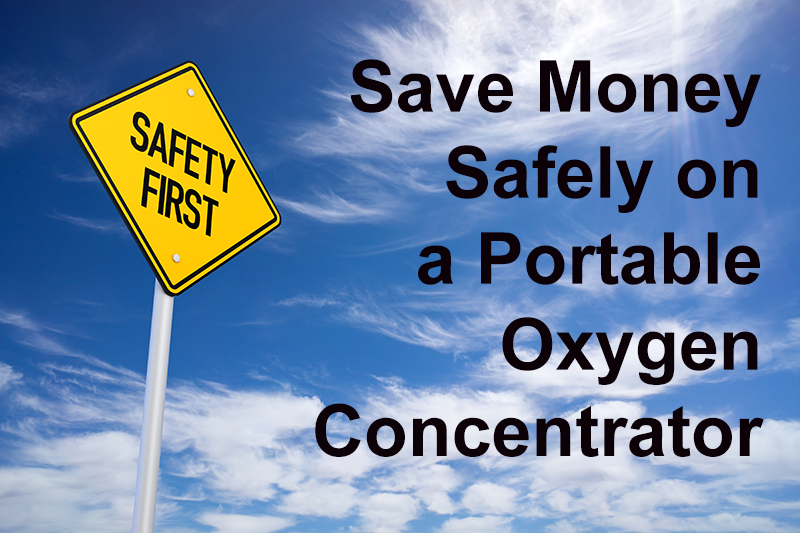
Understanding the Role of Oxygen in the Body
Every organ and cell in the body requires oxygen in order to function. Low oxygen levels can cause cellular damage, organ failure, or even death if experienced over a lengthy period of time.
The air that we breathe is roughly:
- 78% nitrogen
- 21% oxygen
- Trace amount of other gasses
Normally functioning lungs breathe in ambient air, filter out other gasses, and deliver oxygen to a protein in the blood cells called hemoglobin. Hemoglobin carries oxygen via the bloodstream throughout the body to cells, organs, and tissues.
Oxygen levels in the bloodstream is known as oxygen saturation.
Healthy Lung Function
People with healthy lungs generally maintain oxygen saturation in the upper 90 percentile. Anything above 90% is considered normal. If you’re consistently below that, your doctor will likely prescribe you supplemental oxygen to prevent neurological or organ damage.
Low oxygen saturation is known as Hypoxia.
Symptoms of Hypoxia
If your saturation levels fall below 88% you’re likely to experience:
- Headaches
- Shortness of breath
- Confusion
- Dizziness
Portable oxygen concentrators will help alleviate these symptoms and safeguard against the health risks associated with low oxygen levels.
Click here to learn more about Hypoxia.
Getting Your Oxygen Prescription
If you’re suffering from symptoms of hypoxia your doctor will likely give you what is commonly referred to as a PFT or Pulmonary Function Test. This test is done in the pulmonologist’s office and is pain-free and non-invasive.
The doctor will have you walk on a treadmill or up and down the hallway for 5 minutes at a moderate pace. They will then measure your oxygen saturation levels with a device called a pulse oximeter. Based upon your saturation levels the doctor will give you a prescription for an oxygen device.
Your Prescription
The prescription will include 3 things:
- When you are to use your oxygen such as 24/7, only when active, when sleeping etc.
- If you need continuous or pulse flow
- What flow rate you should use
An Investment in Your Health
When purchasing a POC, some consumers may consider used devices sold by private parties or inexpensive, off-brand machines from overseas marketplaces. While these options may seem cost-effective, they pose significant risks to your health, safety, and financial well-being. Here’s why you should think twice before buying a used portable oxygen concentrator from private sellers or cheap alternatives from sites like Amazon.
You Don’t Really Know What You’re Getting
Portable Oxygen concentrators produce medical grade oxygen. If your device is producing anything less than medical grade, you are likely doing yourself more harm than good. There are many risks and unknowns when purchasing from a private party off of Facebook Marketplace, Craigslist or Ebay.
- Improper storage can degrade sieve beds or damage other electronics. It can also greatly shorten battery life or cause them not to hold a charge at all.
- If the former user was ill, you have no idea what bacteria or viruses the machine may be harboring.
- The machine likely has not been tested to ensure that it is dispensing medical grade oxygen.
Without professional guidance, you’re essentially gambling with your health.
Questionable Quality and Safety
Used Portable Oxygen Concentrators
When you purchase a used POC from a private party, you have no way of verifying its condition, history, or maintenance. These devices are complex and require regular servicing to function correctly. Common issues with used POCs include:
- Wear and Tear: Filters, batteries, and internal components degrade over time, reducing efficiency.
- Unreliable Performance: A malfunctioning device may fail when you need it most, leaving you without essential oxygen.
- Lack of Warranty or Support: Used devices often come without a warranty, meaning you’re on your own if something goes wrong. Manufacturers don’t support machines that weren’t purchased from an authorized dealer.
Cheap Chinese Machines on Amazon
You’ll never see Inogen or any other reputable brands selling concentrators on Amazon. That is because FDA approved machines require a prescription to ensure the patient is getting a machine that fulfills their medical needs. The FDA tests and certifies each machine for both medical viability and safety. When you buy a cheap knock-off you forfeit these assurances.
In recent years, the market has been flooded with low-cost, off-brand oxygen concentrators from overseas manufacturers. While these machines may look appealing due to their price, they often fall short in critical areas:
- Non-Compliance: These oxygen concentrators lack FDA approval or certification from other reputable regulatory bodies, meaning their performance and safety are not guaranteed.
- Inferior Materials: Cheap components can lead to frequent breakdowns or even pose fire hazards.
- No Customer Support: If the device fails or needs maintenance, finding help can be nearly impossible.
- Not FAA Approved: The FAA has a list of portable oxygen concentrators that are approved for airline travel. These machines have not been tested for safety and are therefore not on the approved list.
- Legal Risks: Using a non-compliant device could violate insurance policies or Medicare guidelines, potentially leaving you without coverage.
If you look at the manuals of these machines they state clearly that they are not for medical use.
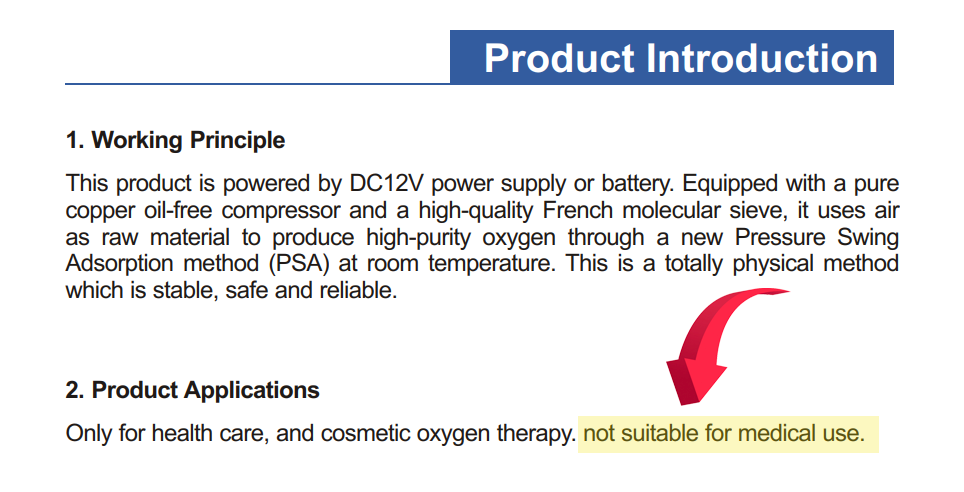
Hidden Costs
At first glance, used POCs and inexpensive alternatives may seem like a way to save money. However, they often come with hidden costs that make them far more expensive in the long run:
- Repair and Maintenance: Fixing a faulty used device can quickly become cost-prohibitive, especially if parts are unavailable.
- Short Lifespan: Low-quality machines and heavily used devices are unlikely to last as long as a new, high-quality POC.
- Medical Emergencies: A malfunctioning oxygen concentrator can lead to hospitalization, which comes with substantial medical bills.
Health Risks
A poorly functioning or substandard POC can directly harm your health. Risks include:
- Hypoxia: Insufficient oxygen delivery can exacerbate your condition, leading to dizziness, confusion, and even life-threatening complications.
- Infection: Used machines may harbor bacteria, mold, or other contaminants if not properly cleaned and sanitized.
- Device Failure: A breakdown at a critical moment could result in a medical emergency.
Other Safe Alternatives
If cost is a concern, there are safer, more reliable options for obtaining a portable oxygen concentrator:
Work with Your Healthcare Provider
Your doctor or respiratory therapist can help you choose a POC that meets your medical needs. They may also direct you to reputable suppliers and assist with insurance claims.
Explore Financial Assistance
- Many credit cards have no interest offers
- Companies such as Pay-Pal have 60 days – same as cash
- Portable oxygen concentrators are approved for HSA purchases
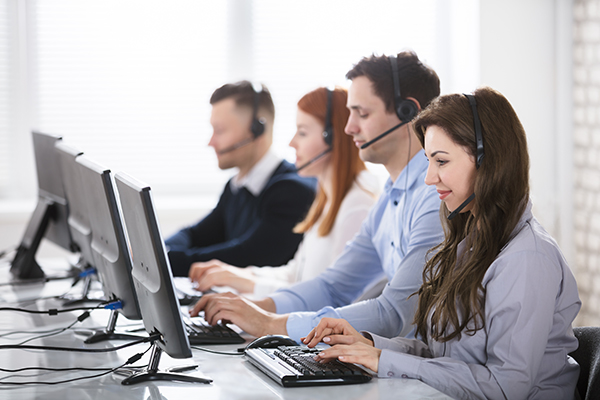
Why Buy From OxiMedical
We are an authorized dealer and offer new and refurbished devices that are guaranteed to meet regulatory standards. When we take in a used machine for resale we put them through rigorous testing and refurbishing to ready them for sale
- Each machine is cleaned and sanitized for safe use
- We test the concentrator to ensure that it is providing high-quality, medical grade oxygen
- Compressors and other components are tested and replaced if found faulty
If you do encounter issues with your machine down the road you can rest assured that we will be here to assist you with troubleshooting or arranging to have your machine sent in for service.
- We provide warranties even with used or refurbished machines.
- If you have any questions or technical issues, our on-shore techs will walk you through troubleshooting your problem, and if necessary arrange to have the machine repaired.
- We are an authorized repair center which greatly cuts down on the service time of your concentrator. We’ll get it fixed and rushed back to you in no time.
We are Determined Get you the Machine You Need
Our solution-based respiratory team will help you find the machine that best fulfills your medical needs and suits your lifestyle expectations.
- As a preferred dealer we have access to best pricing and we pass that savings along to our customers.
- Our Medicare specialists will help make sure that you get all the benefits to which you are entitled.
- We have relationships with lenders who understand many of you are on fixed incomes. They have easy approval requirements and offer low monthly payments.
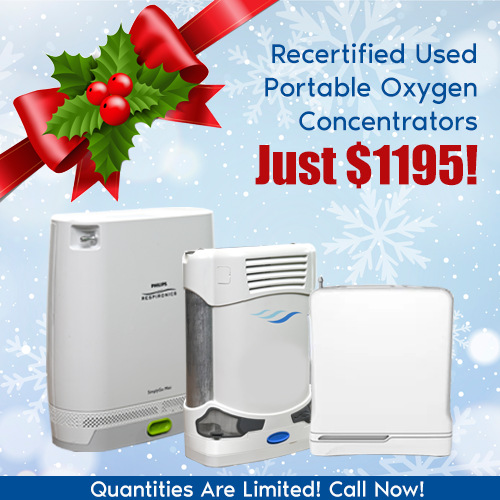
Call OxiMedical today at 1-888-865-7226!
Your health and safety are too important to gamble on used portable oxygen concentrators from private sellers or cheap, unregulated devices from online marketplaces. While these options may appear cost-effective, the risks far outweigh the benefits. We can ensure that your oxygen therapy is safe, effective, and tailored to your needs. Investing in a high-quality POC is an investment in your health and quality of life.





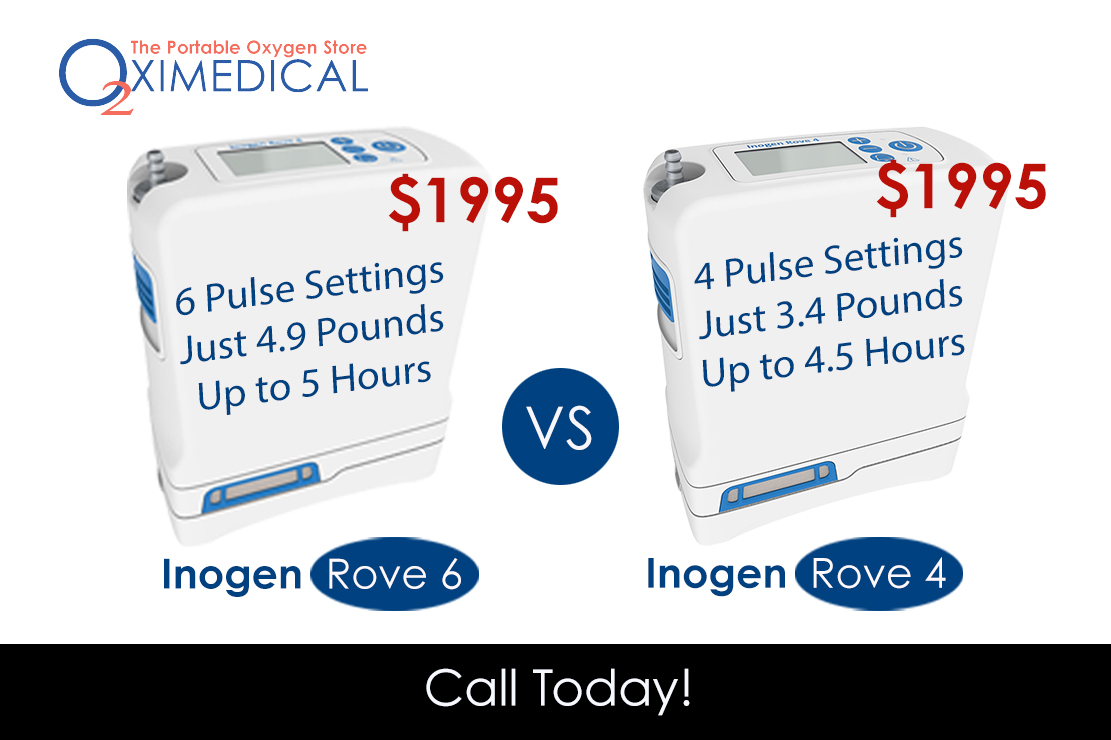

0 Comments